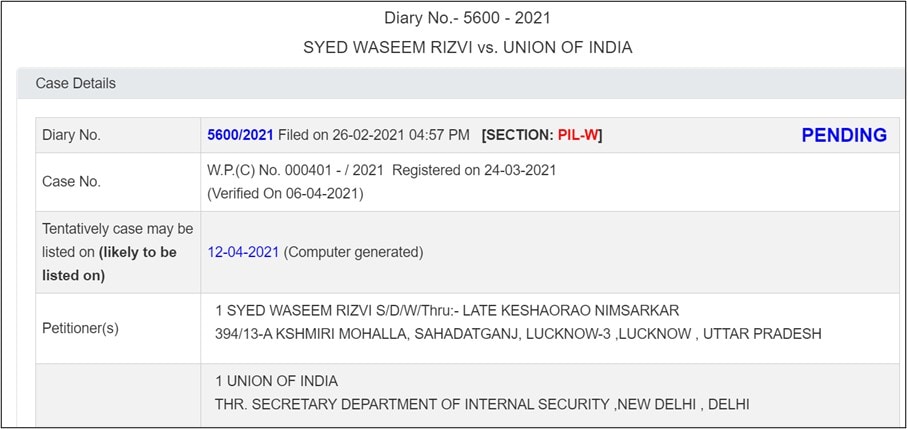Syed Waseem Rizvi, an Indian Shi'ite leader known for issuing provocative statements against the majority Sunni Muslim leadership to gain favor with the country's Hindu rightwing, has filed a petition in the Supreme Court of India seeking the removal of 26 verses of the Koran on the grounds that the verses spread extremism among Indian Muslims.

Syed Waseem Rizvi is a controversial Shi'ite leader in northern India.
Rizvi is the chairman of the Shia Waqf Board in the northern Indian state of Uttar Pradesh, which is ruled by the rightwing Bharatiya Janata Party (BJP), which is also in power at the federal level. In India, the separate waqf boards for Shi'ite and Sunni Muslims are statutory bodies advising the government on the protection and management of Muslim public property.
A report published by LiveLaw.in, an Indian judicial news website, reported that Petition No. WP(C) No: 401 of 2021, filed by Syed Wasim Rizvi, seeks the removal of "certain verses from the Holy Quran that are allegedly negative, promote terrorism, and create the menace of Islamic terrorism in India."[1]
It is not clear whether the petition will soon come up for a hearing in the Supreme Court. Following are excerpts from the LiveLaw.in report:[2]
"The plea filed by UP [Uttar Pradesh] Shia Waqf Board chairman, Syed Waseem Rizvi, impugns 26 verses from the Quran which he states are used as 'justifications' by Islamist terrorist groups for attacks on non-believers/civilians.
"The plea states, 'On account of the versus of Holy Quran, (more particularly described in the Writ Petition), the religion of Islam is drifting away from its basic tenets with a fast pace and nowadays is identified with violent behavior, militancy, fundamentalism, extremism, and terrorism.'
"The petition refers to the following verses: Verse 9 Surah 5; Verse 9 Surah 28; Verse 4 Surah 101; Verse 9 Surah 123; Verse 4 Surah 56; Verse 9 Surah 23; Verse 9 Surah 37; Verse 5 Surah 57; Verse 33 Surah 61; Verse 21 Surah 98; Verse 32 Surah 22; Verse 48 Surah 20; Verse 8 Surah 69; Verse 66 Surah 9; Verse 41 Surah 27; Verse 41 Surah 28; Verse 9 Surah 111; Verse 9 Surah 58; Verse 8 Surah 65; Verse 5 Surah 51; Verse 9 Surah 29; Verse 5 Surah 14; Verse 4 Surah 89; Verse 9 Surah 14; Verse 3 Surah 151; Verse 2 Surah 191.
"In his plea, Rizvi states that Islam is based on the concepts of equity, equality, forgiveness, and tolerance... However, due to extreme interpretations of the above-said verses of the Holy Book, the religion of Islam is drifting away from its basic tenets with a fast pace, and nowadays is identified with militancy, fundamentalism, extremism, and terrorism.
"He further alleges that after the demise of Prophet Muhammad, there was dispute regarding the genuineness of some of the heavenly messages of God the Almighty revealed to Prophet Muhammad and that the Caliphs made a mistake in compiling the Holy Quran.

"The plea draws the Court's attention towards two types of verses in the Holy Book: Messages of Allah which are positive and promote peace, harmony, brotherhood, tolerance, and forgiveness... Messages of Allah which are negative and promote violence, and hatred... 'Why such wide differences in the messages of God the Almighty (Allah) in Holy Quran itself?' The plea remarks.
"It adds, 'the dictates of religion which are not in consonance and overlap with the law of land of any nation and any country passed by the competent elected representatives in the form of parliament/state legislature and the laws and rules made by the United Nations shall have no strength of law and are violative of the law of the land, and the same should not prevail over the same.' Rizvi goes on to allege that several Islamic madrassas are making contribution to Muslim terrorist activities.
"The plea states, 'There are many Muslim madrassas all over the world where young children are taught Islam, and Holy Quran is explained to the Islamic students who are working for terrorist activities, in the Quranic surahs... It is like poison in the raw minds of young children in the name of the message of Allah, which leads him to a radical mindset and from his early age when they become young, they hate people of other religions because of their mindset, and many youths get involved with terrorist organizations in some way under this mentality, the wrong messages of Allah has been filled in the name of Islam.'"
[1] LiveLaw.in (India), March 28, 2021. The original English of the report has been lightly edited for clarity and standardization.
[2] LiveLaw.in (India), March 28, 2021. Read also, MEMRI Inquiry & Analysis Series No. 1098, The Terrorist Groups' Interpretation Of The Koranic Verses Regarding Jihad, June 2, 2014.





